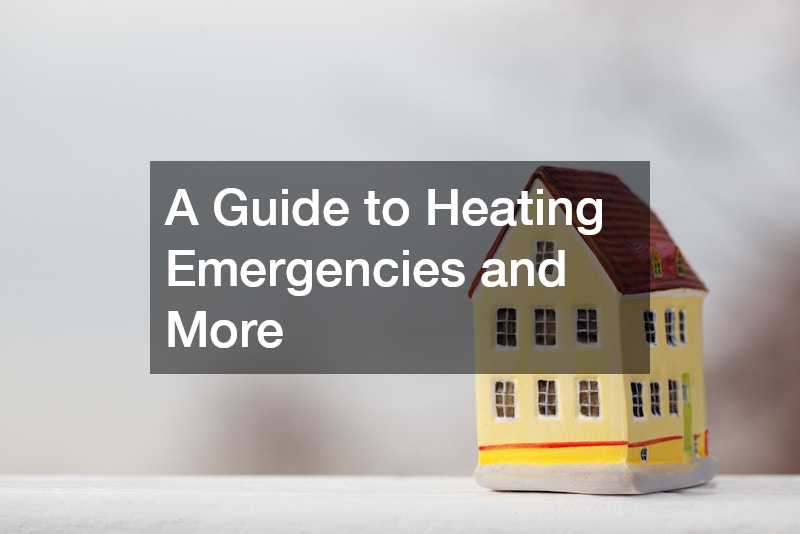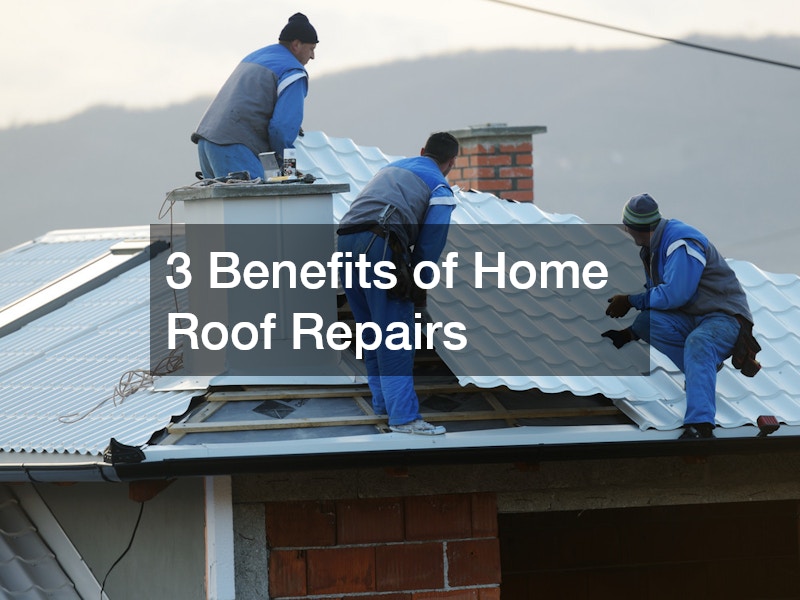Home emergencies can strike at any moment, often catching homeowners off guard. Whether it’s the dead of winter and the heating system fails, or a burst pipe causes flooding, the consequences can be both inconvenient and dangerous. This guide provides a comprehensive look into handling heating emergencies and other common home issues, emphasizing prevention, timely action, and the importance of professional help. From understanding causes to knowing when to call for HVAC repairs, local plumbers, or even a 24 7 locksmith, preparation is key to protecting your home and family.
What Are Common Causes of Heating Emergencies?

Malfunctioning Thermostats
One of the most common culprits in heating failures is a faulty thermostat. When it malfunctions, the system may not activate when needed or could run excessively, causing wear and tear. Thermostats that are out of sync can lead to significant discomfort and higher utility bills.
Dirty or Blocked Filters
Air filters in heating systems must remain clean to allow for proper airflow. Blocked filters make it harder for air to circulate, placing strain on the system. This can trigger overheating, short cycling, or complete shutdowns. Filters clogged with dust and allergens also reduce air quality and can indirectly contribute to mildew growth, prompting the need for mildew removal services.
Problems with Pilot Light or Ignition System
Gas furnaces depend on either a pilot light or an electronic ignition to begin the heating process. If these components malfunction, the system will fail to produce heat. This issue can stem from gas supply interruptions, dirty sensors, or electrical faults that require professional residential electrical service.
Leaky Ductwork
When ductwork leaks, heated air escapes before reaching living areas. Not only does this affect comfort and energy efficiency, but it also causes the heating system to work harder. In some cases, this can compound the need for HVAC repairs due to overuse or system strain.
Lack of Routine Maintenance
Neglecting regular maintenance is a sure way to encounter heating emergencies. Routine checkups by professionals can detect small problems before they escalate into major system failures. Annual tune-ups often involve cleaning, calibration, and safety checks, which help prevent unexpected issues in extreme weather.
How to Prevent Heating Emergencies
Regularly Inspect and Maintain the System
Homeowners should make it a habit to check their heating system, especially before the colder seasons. Look for unusual noises, inconsistent heating, or visible wear. Many minor HVAC repairs can be identified and addressed early with regular inspections.
Install High-Quality Filters
Choosing the right air filters and changing them as recommended can prevent blockages and prolong the life of your system. High-efficiency filters not only improve airflow but also help reduce allergens and irritants in the home.
Monitor Thermostat Functionality
Keeping an eye on the thermostat ensures your system is responding correctly to temperature settings. Smart thermostats provide additional benefits, including remote access and energy usage tracking, which can be useful in identifying patterns and potential malfunctions.
Schedule Professional Inspections Annually
Professional inspections by HVAC technicians help uncover hidden problems and optimize system performance. These inspections can also help identify the need for related services such as residential electrical service or plumbing repair if auxiliary systems are affected.
Educate Family Members on Emergency Responses
Knowing how to turn off the system, recognize warning signs, and contact emergency services is crucial. Share instructions with everyone in the household to ensure a coordinated response when an emergency arises.
What to Do in Case of a Heating Emergency
Identify the Problem Immediately
Quick identification can make all the difference. Whether it’s a strange sound, an unresponsive thermostat, or no heat at all, pinpointing the issue helps you take the appropriate steps.
Shut Down the Heating System
If you suspect a problem, such as a burning smell or abnormal operation, shut down the heating unit to prevent damage or danger. This is especially important if there’s potential for electrical issues or gas leaks.
Open Windows for Ventilation
Proper ventilation is critical if the system emits strange odors or if there’s any suspicion of a carbon monoxide leak. Open windows and doors to allow fresh air to circulate until the source of the problem is resolved.
Call a Professional Technician
Don’t attempt complex repairs unless you are trained. Contact certified HVAC repair professionals who can safely restore your system. Many companies offer emergency services, especially during extreme weather conditions.
Use Temporary Heating Solutions
Portable electric heaters or heated blankets can provide temporary comfort while awaiting repairs. Be sure to use these devices responsibly and never leave them unattended. Insulating a single room and focusing your heating efforts there can help maintain warmth.
What Are Other Common Home Emergencies?
Plumbing Leaks and Water Damage
Burst pipes, dripping faucets, and water heater malfunctions are common plumbing issues. Left unchecked, they can cause extensive water damage and promote mold and mildew growth. In such cases, timely plumbing repair by local plumbers is essential to restore your home’s integrity.
Electrical Failures
Tripped breakers, flickering lights, or power outages are signs of potential electrical issues. These problems may require prompt attention from professionals offering residential electrical service to prevent safety hazards such as electrical fires.
Gas Leaks
Gas leaks pose a serious health risk. The scent of sulfur or a hissing noise near appliances could indicate a leak. Immediate evacuation and a call to your gas provider are necessary. It’s important not to turn on any electrical switches or devices during this time.
Roof Leaks
Water intrusion from a damaged roof can lead to structural problems and requires immediate attention. If the leak is caused by storm damage or a fallen branch, you may need emergency tree services to remove debris and prevent further damage.
Animal or Insect Infestation
Unwanted pests can create both health and structural problems. Whether it’s rodents chewing wires, termites damaging wood, or mosquitoes breeding near stagnant water, swift action is crucial. Mosquito removal and bed bug removal services are two essential tools in maintaining a healthy and safe home.
How to Handle Electrical Emergencies
Turn Off Power Supply
The first response to any electrical emergency is to shut off the power at the breaker box. This reduces the risk of electrocution and limits potential fire damage.
Use a Multimeter to Check Circuits
If you’re trained to do so, a multimeter can help you safely check circuits and identify the source of the issue. Otherwise, wait for professional help.
Avoid Water Contact with Electricity
Never handle electrical equipment or wires near water. This is particularly important during storms or flooding when water may come into contact with live wiring.
Call a Certified Electrician
Certified electricians specializing in residential electrical service should always handle complex or dangerous electrical problems. Their expertise ensures that repairs meet safety standards and local codes.
Follow Electrical Safety Tips
Unplug unused appliances, avoid daisy-chaining extension cords, and install surge protectors. These small actions can prevent major electrical problems and reduce the risk of emergencies.
What Steps Can Be Taken for Plumbing Emergencies?

Identify the Source of Leak
Quickly locating the source of a leak is essential. Check beneath sinks, around appliances, and near the water heater to isolate the issue.
Shut Off Water Main
Shutting off the main water supply helps stop further flooding. This step is crucial in preventing additional water damage, especially when waiting for local plumbers to arrive.
Use Temporary Patching Solutions
Pipe clamps, plumbing tape, and epoxy can temporarily stop leaks until permanent repairs can be made. These should only be used in low-pressure areas as a short-term fix.
Drain Excess Water
Soak up and remove standing water using towels, mops, or wet vacs. Doing so quickly helps prevent mildew growth and structural deterioration.
Call a Professional Plumber
Always contact a licensed plumber to conduct thorough plumbing repair. Many local plumbers offer emergency services, which is vital for minimizing downtime and damage.
How to Detect Gas Leaks and What to Do
Recognize the Smell of Gas
Natural gas is odorized with a sulfur-like scent to help with detection. If you notice a rotten egg smell, take it seriously and begin evacuation procedures.
Listen for the Hissing Sound
Hissing or whistling noises near gas appliances or pipelines may indicate a leak. Do not attempt to inspect or repair the source yourself.
Check Gas Appliances
Ensure all gas-burning appliances are off. If one is left on without a flame, this could release gas into the home, increasing risk.
Evacuate and Ventilate the Area
Quickly leave the building and open doors and windows on your way out. Avoid using phones or light switches indoors, as any spark could ignite the gas.
Contact Gas Company Immediately
Once outside and safe, call your utility provider or emergency services. They will shut off the gas supply and inspect for safety before allowing re-entry.
What Preparations Are Needed for Natural Disasters?
Create an Emergency Kit
Prepare a kit with food, water, first aid, flashlights, and medications. It should also include contact numbers for emergency services such as local tree service or 24 7 locksmiths in case of blocked exits or storm damage.
Develop a Family Evacuation Plan
Create and practice a detailed evacuation plan. Every member of the household should know where to go and what to do during different types of disasters.
Secure Important Documents
Keep important documents like IDs, insurance papers, and property records in a waterproof, fireproof container. Digital backups stored on secure cloud platforms are also recommended.
Regularly Review and Update Disaster Plans
Situations change, and so should your emergency preparedness. Review plans annually and adjust as needed to reflect new household members, pets, or changes in local emergency protocols.
Ensure Home Insurance Coverage
Review your home insurance policy to ensure it covers common disasters in your area, including flooding, fire, and fallen trees. Adding supplemental coverage may be necessary based on regional risks.
What Are Some Temporary Heating Solutions?

Use Portable Heaters
Portable electric or oil-filled space heaters can provide immediate warmth during a heating system failure. Always follow safety instructions and keep flammable items away.
Insulate Windows with Heavy Drapes
Heavy curtains help retain heat and block cold air from entering. They are especially effective in older homes with single-pane windows.
Seal Drafty Areas
Weatherstripping, foam sealants, and door sweeps are quick and effective ways to keep cold air out. Sealing these gaps helps your temporary heating efforts go further.
Use Electric Blankets
Electric blankets offer direct warmth and are an efficient option when central heating isn’t working. Always use models with automatic shutoff for safety.
Heat One Room Effectively
Choose a single room to occupy and insulate it well. Close doors to unused rooms and focus heating efforts where it will be most effective.
What Are Fire Safety Measures in Home Emergencies?

Install and Maintain Smoke Detectors
Working smoke detectors are your first line of defense against house fires. Test them monthly and change the batteries twice a year.
Keep Fire Extinguishers Accessible
Place extinguishers in the kitchen, garage, and hallways. Ensure every adult in the household knows how to use them properly.
Develop a Fire Escape Plan
A detailed fire escape plan includes multiple exit routes from each room and a designated meeting point outside. Practice it regularly with all household members.
Avoid Overloading Sockets
Avoid plugging multiple high-wattage appliances into the same outlet. Overloaded circuits are a leading cause of house fires.
Conduct Regular Fire Drills
Fire drills train your family to respond calmly and effectively in a real emergency. Schedule drills twice a year to keep everyone prepared.
Closing Thoughts
Heating emergencies and other household crises can feel overwhelming, but the right preparation and knowledge can significantly reduce their impact. By understanding the causes and symptoms of these issues, taking preventive steps, and knowing when to call for professional help—whether it’s HVAC repairs, plumbing repair, mosquito removal, or emergency tree services—you can protect your home and family. Make a habit of regular maintenance, keep emergency contact numbers handy, and stay vigilant. With a proactive approach, you can handle any home emergency with confidence and control.
It’s also important to recognize that emergencies come in many forms—some subtle and some sudden. From discovering bed bugs in the middle of the night to realizing your thermostat has failed during a snowstorm, being prepared means having a plan, the right resources, and trusted local professionals at your fingertips. Establish relationships with local plumbers, residential electrical service providers, pest control experts, and even a reliable 24 7 locksmith so that when something goes wrong, you’re not scrambling for help. Small steps like this add up, turning potential disasters into manageable situations. The safety, comfort, and well-being of your household depend on it.



